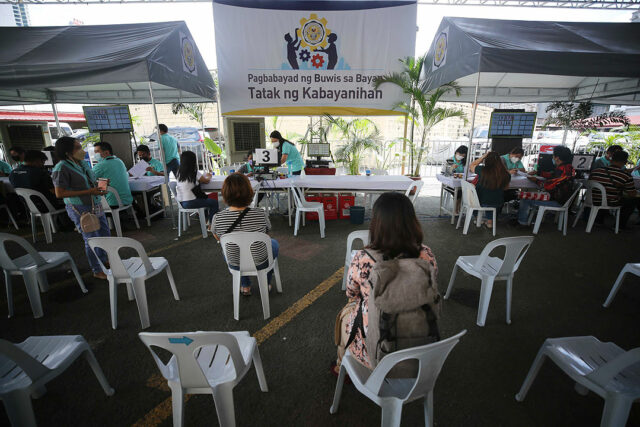
PRESIDENT Rodrigo R. Duterte ordered all government agencies to use digital methods in disbursing and collecting payments, a step that could put the Philippines closer to becoming a cash-lite society.
In Executive Order (EO) No. 170, Mr. Duterte said the digitalization of payments is in line with the government’s effort to develop an inclusive digital financial ecosystem, which would make formal financial services accessible to more Filipinos.
“All departments, agencies, and instrumentalities of the government, including state universities and colleges, government-owned or -controlled corporations, are hereby directed, and local government units are hereby enjoined, to adopt digital payments for their respective disbursements and collections,” the order stated.
The EO also directed all covered agencies to use “safe and efficient” digital disbursement, including distribution of financial assistance and payment of salaries, wages and allowances to employees.
“Covered agencies shall be allowed to disburse funds directly into the transaction accounts of recipients or beneficiaries, whether held in government or private financial institutions, without need of a special arrangement from the financial institutions concerned,” the order read.
A government servicing bank will carry out the payment instructions, and is allowed to collect fees from covered agencies for electronic fund transfers.
The EO also requires all covered agencies to offer a digital mode of collecting payments for taxes, fees, tolls and other charges. These agencies should still accept cash and other traditional forms of payment.
“Digital collection of payments will expedite transactions, generate savings for the government, and reduce the risk for graft and corruption,” Bangko Sentral ng Pilipinas (BSP) Governor Benjamin E. Diokno said via Twitter.
Covered agencies are expected to adopt a business continuity plan that will be implemented in times of calamity to ensure digital payments will not be affected, and to ensure traditional payout channels can be offered.
These institutions can also tap payment service providers that are compliant with the National Retail Payment System Framework.
A technical working group (TWG) on the adoption of digital payments will be formed, composed of representatives from the departments of Finance and Budget, Bureau of the Treasury, Bureau of Internal Revenue (BIR), and the Government Procurement Policy Board Technical Support Office.
Implementing rules and regulations (IRR) should be released within 90 days from the effectivity of the EO.
Covered agencies will be given six months after the issuance of the IRR to fully implement digital disbursements and collections. However, a tiered transition period may be allowed for other government agencies, depending on their operational readiness and capability.
Funding for the initial implementation of the EO will be under the respective budgets of the covered agencies. For the succeeding years, the funding will be incorporated in their respective regular appropriations or corporate operating budgets.
“Concerned agencies are encouraged to establish programs to capacitate their personnel on innovative technologies, payment systems, and cybersecurity and data privacy protection tools, and shall build public understanding on digital financial services,” the order stated.
The TWG will determine which agencies are capable of adopting digital payments within a shorter or longer period.
Fintech Alliance.ph Chairman Angelito M. Villanueva said that government-to-person as well as person-to-government transactions are among the largest financial transaction use cases that could help boost digital adoption in the country.
“This must be complemented with fast, reliable, and affordable data and telecoms infrastructure even in remote areas in the country to allow more users to embrace it,” Mr. Villanueva said in a Viber message.
Based on data from the Bangko Sentral ng Pilipinas, 93.2% of government payments were done digitally in 2020. Payment of salaries for government employees was fully digitalized in the same year.
Digital payments made up 20.1% of all transaction volumes in 2020. By 2023, the BSP is looking to bring digital payments to 50% of all transaction volume. — Luz Wendy T. Noble
For all the latest Business News Click Here
For the latest news and updates, follow us on Google News.
